- Home
- Leslie Meier
Irish Parade Murder
Irish Parade Murder Read online
Books by Leslie Meier
MISTLETOE MURDER
TIPPY TOE MURDER
TRICK OR TREAT MURDER
BACK TO SCHOOL MURDER
VALENTINE MURDER
CHRISTMAS COOKIE MURDER
TURKEY DAY MURDER
WEDDING DAY MURDER
BIRTHDAY PARTY MURDER
FATHER’S DAY MURDER
STAR SPANGLED MURDER
NEW YEAR’S EVE MURDER
BAKE SALE MURDER
CANDY CANE MURDER
ST. PATRICK’S DAY MURDER
MOTHER’S DAY MURDER
WICKED WITCH MURDER
GINGERBREAD COOKIE MURDER
ENGLISH TEA MURDER
CHOCOLATE COVERED MURDER
EASTER BUNNY MURDER
CHRISTMAS CAROL MURDER
FRENCH PASTRY MURDER
CANDY CORN MURDER
BRITISH MANOR MURDER
EGGNOG MURDER
TURKEY TROT MURDER
SILVER ANNIVERSARY MURDER
YULE LOG MURDER
HAUNTED HOUSE MURDER
INVITATION ONLY MURDER
CHRISTMAS SWEETS
CHRISTMAS CARD MURDER
IRISH PARADE MURDER
Published by Kensington Publishing Corp.
A Lucy Stone Mystery
IRISH PARADE MURDER
LESLIE MEIER
www.kensingtonbooks.com
All copyrighted material within is Attributor Protected.
Table of Contents
Also by
Title Page
Copyright Page
Dedication
Chapter One
Chapter Two
Chapter Three
Chapter Four
Chapter Five
Chapter Six
Chapter Seven
Chapter Eight
Chapter Nine
Chapter Ten
Chapter Eleven
Chapter Twelve
Chapter Thirteen
Chapter Fourteen
Chapter Fifteen
Chapter Sixteen
Chapter Seventeen
Chapter Eighteen
Chapter Nineteen
Chapter Twenty
This book is a work of fiction. Names, characters, businesses, organizations, places, events, and incidents either are the product of the author’s imagination or are used fictitiously. Any resemblance to actual persons, living or dead, events, or locales is entirely coincidental.
To the extent that the image or images on the cover of this book depict a person or persons, such person or persons are merely models, and are not intended to portray any character or characters featured in the book.
KENSINGTON BOOKS are published by
Kensington Publishing Corp.
119 West 40th Street
New York, NY 10018
Copyright © 2021 by Leslie Meier
All rights reserved. No part of this book may be reproduced in any form or by any means without the prior written consent of the Publisher, excepting brief quotes used in reviews.
Library of Congress Card Catalogue Number: 2020944028
The K logo is a trademark of Kensington Publishing Corp.
ISBN: 978-1-4967-1039-0
ISBN-10: 1-4967-1039-8
First Kensington Hardcover Edition: February 2021
ISBN-13: 978-1-4967-1041-3 (ebook)
ISBN-10: 1-4967-1041-X (ebook)
For Beryl and Kevin Daley
Chapter One
“I just want to say that this was absolutely the loveliest, most beautiful funeral I’ve ever attended,” said the woman, grasping Lucy Stone’s hand and leaning in a bit too close for Lucy’s comfort. Some people were like that, and Lucy resisted the urge to draw away, and smiled instead at the woman, who was middle-aged and dressed appropriately for such a somber occasion in a simple navy-blue dress and pearls. Her hair was a warm brown, probably colored, and she had applied her makeup with a light hand: a touch of foundation, mascara, and soft pink lipstick. Lucy didn’t know the woman, but she didn’t know most of the people she was greeting in the reception line at her father-in-law’s funeral, and she assumed she was a friend or neighbor.
“You know, it made me feel as if I actually knew Mr. Stone,” continued the woman, exploding that theory. “And what a wonderful family you have.”
A bit weird, thought Lucy, wondering if the woman made a hobby of attending total strangers’ funeral services. They were listed in the newspaper, after all, and anyone who had a passing interest could come. It was because of those listings that the funeral director had advised them to make sure someone stayed at the house, since burglars were known to take advantage of those notices, too.
“What a nice thing to say, and thank you for coming,” said Lucy, passing the woman along to her husband, Bill, who was next in the reception line, and greeting Maria Dolan, who was Edna’s best friend and one of the few people at the reception that she actually knew.
“Edna seems to be holding up,” observed Maria, glancing at Lucy’s newly widowed mother-in-law, “but I’ll be keeping an eye on her and making sure she doesn’t get lonely. I know you Maine folks can’t be popping down to Florida every time she feels a bit blue.”
“Thank you so much. I really appreciate that,” said Lucy, who was finding her present situation somewhat surreal. It was only two weeks ago, when Lucy was still clearing away the Christmas decorations, that Edna had called, saying Bill Senior had suffered a heart attack but was going to be just fine. She had insisted on downplaying the situation, but Bill, an only child, had immediately booked a seat on the next flight to Tampa.
When he called Lucy from the hospital, he reported that Edna was either in denial or hadn’t understood the seriousness of the situation, as his father was in the ICU in critical condition and wasn’t expected to survive. He asked Lucy to inform the kids and prepare them for their grandfather’s death. He also urged her to book a flight as soon as possible, as they would have to plan a funeral and support his mother. But even as her husband lay dying, Edna refused to believe there was any cause for concern and insisted that her son was making too much of a fuss. And when her husband finally did slip away in the final days of January, she opted for a quick cremation, to be followed by a simple memorial service. “No need for the kids to come all this way. My Bill wouldn’t want a big fuss. He always said he hated funerals and didn’t even want to attend his own,” she said. “Elizabeth’s in Paris, Toby’s in Alaska, and Sara is just starting her new job in Boston, and their granddad would want them to look to the future. Young people don’t want to waste time at some dreary memorial service, and why should they?”
But much to Edna’s surprise, the kids immediately made plans to come to Florida. Elizabeth insisted she had to say a final adieu to her grand-père, Toby and his wife, Molly, brought Patrick to remember his Poppop, and Sara, who was waiting until June to start her new job at the Museum of Science in Boston, offered to stay with her grandma for a week or two to help out. Zoe, the youngest, who was still in college, wasn’t sure she’d be able to make it, but in the end was able to postpone some exams and joined the grieving family that had gathered in Edna’s spacious ranch house.
Lucy wasn’t sure what to expect, but it turned out that people in Florida weren’t much different from folks in Tinker’s Cove, Maine. There was a steady stream of visitors offering sympathy, and many brought casseroles and desserts for the mourning family. And when they all finally gathered in the modern church, all angles and abstract stained glass, which was so different from the centuries-old church in Maine, with its clear glass windows and tall white steeple, the memorial service wasn’t dreary at all, but was instead a true celebration of Bi
ll Sr.’s life.
The service began with one of his favorite hymns, “For the Beauty of the Earth,” and was followed by a favorite Irish prayer that he often repeated: “May you be in heaven before the devil knows you’re dead.” The kids all spoke of favorite memories they cherished of their grandfather. Elizabeth remembered the rainbow-colored Life Savers he always carried and shared with her, Patrick remembered catching his first fish with Poppop’s help, Sara recalled the loud rock and roll he favored, which grew even louder as his hearing began to fail, and Zoe remembered countless games of checkers that Poppop somehow never won. Toby recalled that, as a child, he loved helping Poppop wash his car, but admitted that the time he tried to do it himself, as a surprise, didn’t go well because the car was a convertible and the top was down, but Poppop had just laughed and said it was about time the inside got washed, too.
Lucy knew all these stories, of course, except for Toby’s misadventure, which was a surprise to her. It was the minister’s eulogy, however, that revealed her father-in-law’s deep spirituality and faith, which she hadn’t appreciated. “Bill Stone was a man who practiced his faith through action,” said Rev. Florence Robb, “and he spent countless hours delivering Meals on Wheels, giving rides to the homebound, and working at the local food pantry. He helped at worship services, sometimes as an usher, sometimes reading the lessons and prayers. If something was needed, he provided it, often before it was missed. He replaced light bulbs, tightened screws, polished the brass, and those were only the things he did inside the church. Outside, he mowed the grass, weeded the flower beds, pruned the bushes, and repaired the church sign when it was torn down in a storm. In his quiet way, he made a huge difference in many people’s lives, and he will be missed.” She paused, and her voice breaking, added, “Greatly missed.”
All this was running through Lucy’s mind as she smiled and accepted the condolences offered by the people who had attended the funeral—dear friends, neighbors, and people whose lives had been touched by Bill Stone Sr. And also, as the reception line finally petered out, at least one total stranger who admitted she hadn’t known Bill Stone Sr. at all.
Finally released from her duties on the reception line, Lucy glanced around the room, making sure everyone was all right. Bill had taken charge of his mother and had led her to the buffet table, where he was filling a plate for her. The kids were gathered in a corner, taking advantage of this rare opportunity to hang together and catch up with each other. There was plenty of food and drink, and there was a steady buzz of conversation punctuated with laughter, as was usual after the solemnities had been dispensed with and people took the time to reminisce, renew acquaintances, and enjoy each other’s company. As she scanned the crowd, Lucy looked for the woman in the blue dress and pearls, but didn’t see her. She did see Bill, however, trying to catch her eye, and she quickly joined him and Edna.
“Quite a nice turnout,” she said, taking Edna’s arm and leading her to one of the chairs that were lined up against the wall. “It’s good to know that Pop was appreciated by so many people.”
“I suppose so,” said Edna, pushing her potato salad around with a plastic fork. She sighed. “I don’t know what I’m going to do with myself, now that he’s gone.”
“He was a force to be reckoned with, that’s for sure,” said Lucy, squeezing Edna’s hand. “But you’re not alone. We’re here for a few more days, Sara plans to stay for a week or more, and I hope you’ll come visit us in Maine very soon. There’s always a place for you at our house, you know.”
“I know,” said Edna, but she didn’t sound as if she really believed it.
* * *
A week later, the Florida sun was only a memory as Lucy was back at her job in wintry Maine, working as a part-time reporter and feature writer for the Pennysaver, the weekly newspaper in the quaint coastal town of Tinker’s Cove, but she was having a hard time concentrating on the intricacies of the rather complicated changes being proposed to the town’s zoning laws. “What exactly is an overlay district?” she asked Phyllis, the paper’s receptionist, who was seated at her desk across the room, tucked behind the counter where members of the public filled out orders for classified ads, renewed subscriptions, dropped off letters to the editor, and occasionally complained.
“Beats me,” said Phyllis, with a shrug of her shoulders. She was occupied with entering the week’s new batch of classified ads and was peering through the heart-shaped reading glasses that were perched on her nose and that matched her colorful sweatshirt, which was bedecked with hearts and flowers, in contrast to the dreary reality of lingering dirty snow outside. “I don’t know where to put this thank-you to Sheriff Murphy,” she groaned. “Is it an announcement?”
Lucy perked up, her curiosity piqued. “What thank-you?”
“All about his help for some fund drive.”
“Who submitted it?”
“Uh, it’s right here.” Phyllis studied the slip. “Someone named Margaret Mary Houlihan, corresponding secretary of the Hibernian Knights Society. Do you know her?”
“No, can’t say I do. The Hibernian Knights present the big St. Patrick’s Day parade over in Gilead, but the thank-you is a new one on me.”
“Where do you think I should put it?”
“That I don’t know. Better ask Ted.” Ted Stillings was the publisher, editor, and chief reporter for the paper, which he’d inherited from his grandfather, a noted regional journalist. Times had changed since his day, however, and Lucy knew that Ted was hard-pressed to keep the little weekly paper afloat. Like newspapers throughout the country, the Pennysaver was faced with a diminishing list of advertisers and subscribers, and constantly increasing production costs.
“Well, I would if he was here, but he hardly ever is these days,” complained Phyllis. After a pause she added, “Is it me, or do things seem a bit weird around here?”
“Weirder than usual?” asked Lucy, who hadn’t really been paying much attention since she’d returned from Florida. She’d been focused on staying in touch with Edna and keeping Bill’s spirits up.
“Yeah. While you were gone Ted’s had a lot of meetings with, well, folks who aren’t from around here. Fancy types, in city-slicker clothes.”
“Really?” Lucy’s interest was piqued. “Like who?”
“Well, there was a middle-aged man, with quite a big belly, dressed in a suit and tie. He was nice enough, made a lot of jokes, and laughed a lot, but didn’t give his name or business. Then Ted arrived and whisked him off—took him out to lunch, I think.”
“And when Ted got back from lunch, did he offer any explanation?”
“Nope. I asked if he was buying life insurance. It kind of just popped out. I guess the guy seemed kind of like a salesman, but Ted just chuckled and gave me a big pile of listings for the Events column.” Phyllis paused to polish her glasses. “I definitely got the feeling he didn’t want to continue the discussion.”
“He is always complaining about the rising cost of newsprint . . .” said Lucy.
“And the declining number of subscribers,” added Phyllis. “And that’s another thing. He had me research all sorts of facts and figures, like ad revenue, classified ad revenue, production costs . . .” She let out a big sigh. “Not exactly my cup of tea, if you know what I mean.”
“How did the figures look?” asked Lucy, beginning to feel rather uneasy. Was it possible that Ted wasn’t just worrying out loud but that the Pennysaver was really in dire financial straits? Was he thinking of selling the paper, or even shutting it down permanently?
“Not good,” admitted Phyllis, “but I’m no accountant. I can’t even balance my checkbook.”
“Neither can I,” admitted Lucy. “I just cross my fingers, and if the bank says I have more money than I think I have, then it’s a good month.”
“Wilf manages our money,” confessed Phyllis, sounding a bit smug as she referred to her husband. They had married late in life, and she was clearly enjoying married life. “And then the
re was that woman, done up to the nines, with high-heeled boots and that bleached-blond hair that looks natural so you know it must cost a fortune.”
Lucy noticed that Phyllis’s tone had changed; she sounded worried when she spoke about the woman. “I’m confused,” admitted Lucy. “Does Wilf know this woman?”
“No way.” Phyllis dismissed that idea with a flap of her hand. “She came here to the office and, again, no introduction. Ted just dragged her off. He was gone for a couple of hours, and when he got back, not a word. He just sat down and started pounding out his weekly editorial.”
“You have no idea who she was?” Lucy considered possible identities for a woman with a city hairdo and high heels. “Maybe she was some sort of sales rep? A highflying real estate agent?”
“Your guess is as good as mine,” said Phyllis, “but she looked like trouble to me.”
Lucy was inclined to agree. She tended to be suspicious of women in high heels, who clearly did not have to negotiate the icy sidewalks and muddy driveways that were an annual feature in Maine as winter began to loosen its grip and temperatures began to rise above freezing in the day, only to refreeze at night. Everyone she knew, male and female, wore duck boots beginning with the first February thaw and right on through June.
“Any other suspicious characters?” asked Lucy, thinking this was beginning to sound like a Sherlock Holmes story. Of course, Sherlock would immediately identify the jovial man as having come from Portland, where he’d recently stopped for gas and a stale tuna sandwich. The woman, he would assert, undoubtedly came from Chestnut Hill, where she raised Dobermans and ran a sado-masochistic dungeon patronized by wealthy men with guilty consciences.
“A tall, skinny man in a plaid shirt and jeans with a big Adam’s apple,” offered Phyllis, interrupting Lucy’s thoughts. “He had a deep voice. He greeted me politely, ‘Good morning, ma’am,’ he said. That’s how I know about his voice.”

 Christmas Card Murder
Christmas Card Murder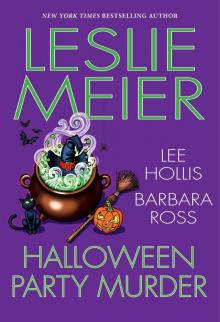 Halloween Party Murder
Halloween Party Murder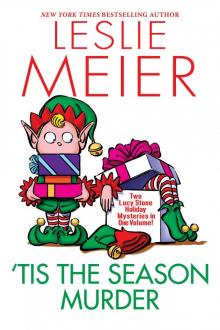 'Tis the Season Murder
'Tis the Season Murder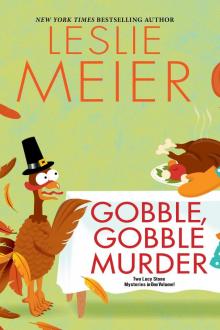 Gobble, Gobble Murder
Gobble, Gobble Murder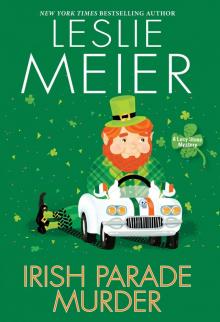 Irish Parade Murder
Irish Parade Murder Bake Sale Murder
Bake Sale Murder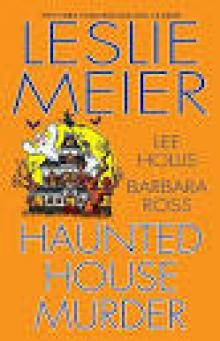 Haunted House Murder
Haunted House Murder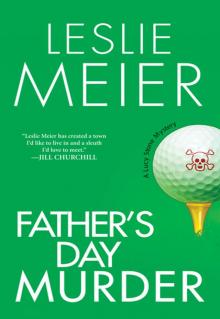 Father’s Day Murder
Father’s Day Murder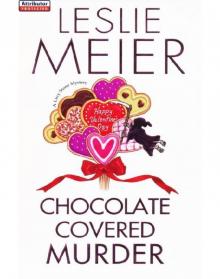 Chocolate Covered Murder
Chocolate Covered Murder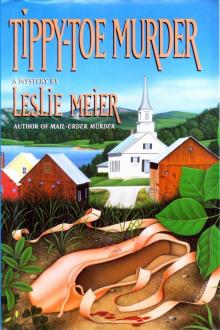 Tippy Toe Murder
Tippy Toe Murder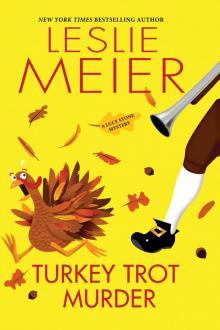 Turkey Trot Murder
Turkey Trot Murder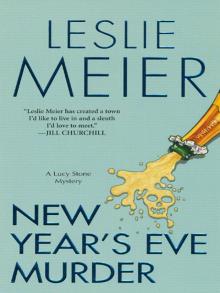 New Year's Eve Murder
New Year's Eve Murder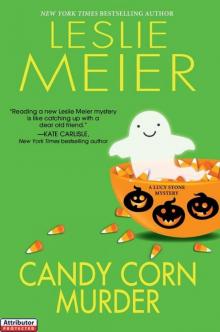 Candy Corn Murder
Candy Corn Murder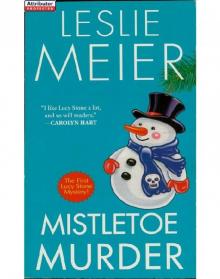 Mistletoe Murder
Mistletoe Murder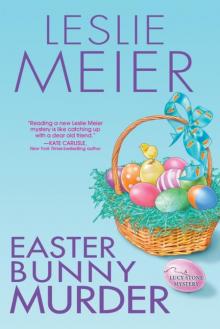 LStone 20 - Easter Bunny Murder
LStone 20 - Easter Bunny Murder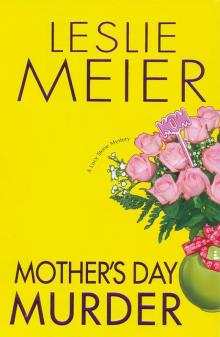 Mother's Day Murder
Mother's Day Murder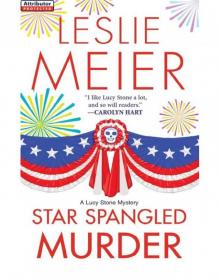 Star Spangled Murder
Star Spangled Murder Silver Anniversary Murder
Silver Anniversary Murder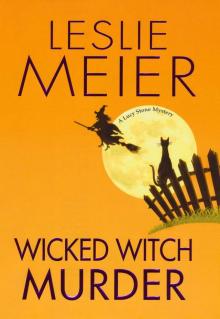 Wicked Witch Murder
Wicked Witch Murder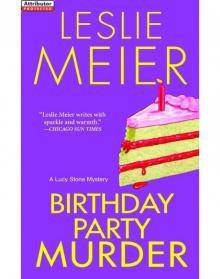 Birthday Party Murder
Birthday Party Murder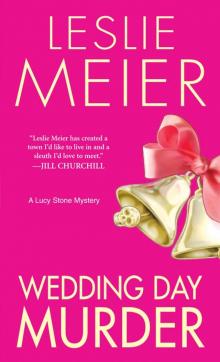 Wedding Day Murder
Wedding Day Murder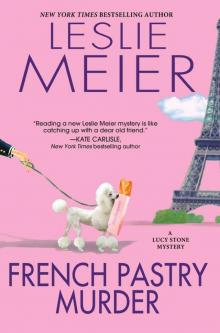 French Pastry Murder
French Pastry Murder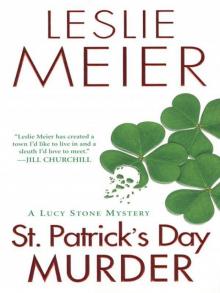 St. Patrick's Day Murder
St. Patrick's Day Murder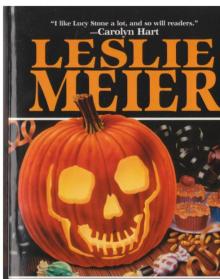 Trick or Treat Murder
Trick or Treat Murder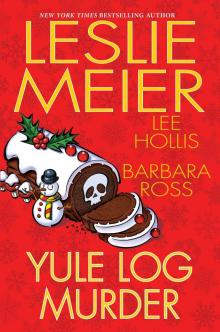 Yule Log Murder
Yule Log Murder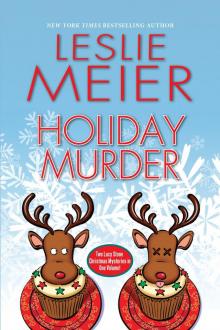 Holiday Murder
Holiday Murder British Manor Murder
British Manor Murder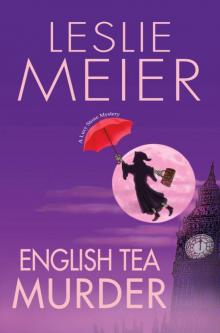 English Tea Murder
English Tea Murder